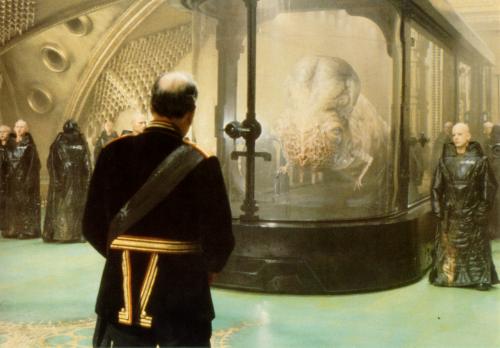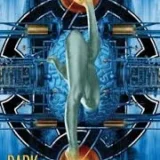 The Martian by Andy Weir
The Martian by Andy Weir
Crown, February 11th, 2014
384 pages
$24.00
Mars. It looms in our imagination. From Edison’s counterattack following Well’s chronicling of the late 19th century invasion, to Burroughs’ thoroughly unique Barsoom, to Brown’s annoyingly sarcastic green denizens, Paul’s furry-chested natives, Brackett’s and Kline’s swachbuckling, Robinson’s terraforming, Pohl’s Cybermen and NASA’s continued delays, we don’t seem to be able to escape the lure of the red planet.
It was therefore with some small degree of fannish cynicism and great doubt that I approached Andy Weir’s The Martian; true it was receiving tremendous reviews and managed to make the NY Times Best Seller list, but as many of us have come to realize, such things often represent exceedingly minor mitigation.
Will it surprise you to learn that I thoroughly enjoyed and highly recommend this novel? Perhaps not, but I can say that it greatly surprised me. So much so that I can give it no greater accolade than to note that it is the first novel in several decades that I have not been able to put down. Sleep did reluctantly intervene and broke my reading sessions into two marathoners, time I do not regret giving up to a novel that takes what we’ve come to call the Heinleinian school of science fiction story telling by the throat, gives it a thorough throttling, adds a few 21st century filigrees, spot on scientific extrapolation and an adventurous, cliff-hanging pull.
In short, Andy Weir has made the genre his own – carefully straddling the no-nonsense, let’s get to the big idea old school sensibilities of classic SF and our new found (long brooding) desire for greater characterization and more literary sensibility. But do not mistake that last as suggesting that The Martian is full of florid prose and time wasting sensory embellishment. The Martian is an aerodynamically optimized dragster that gets all the character it needs from the roar of its engine.
The Martian took the unconventional path to traditional publication, first having been released by Mr. Weir as a self-published work on his blog. It received quite a bit of attention (though managing to bypass the SF circles I travel in) before being picked up by Crown. It’s publishing history (self-pubbed in 2011, re-pubbed in 2014 with a new copyright that’s presenting the Hugo Awards committee no small amount of rumination – but only because if eligible, this work will be a serious contender for the Best Novel Award) is a by now not unfamiliar pattern and a testament to the work that traditional publishers do, despite the attacks they’ve been subjected to recently.
The Martian is exactly the kind of hard science, near-future adventure tale that many of us have been waiting for. Taking place within the context of NASA’s manned exploration woes and the ambitious efforts of private space ventures, it promises the kind of future that Baby-Boomers and older fen grew up with: humankind triumphant, though not without hard won victories; a believable story of ingenuity and pluck, not to mention humanity’s vaunted will to survive.
 There have been many plans – serious, hard science plans – put forth for the exploration of Mars. One quite promising method, known as the Mars Direct scheme, forms the initial background to this tale. Mars Direct promulgates the idea of sending Earth Return Vehicles to the red planet ahead of astronaut explorers; a lander with an ascent vehicle attached is remotely piloted to the Martian surface (presumably put down in an area of interest) and after landing the ascent vehicle begins a long but reliable process of manufacturing its own fuel for the return ascent.
There have been many plans – serious, hard science plans – put forth for the exploration of Mars. One quite promising method, known as the Mars Direct scheme, forms the initial background to this tale. Mars Direct promulgates the idea of sending Earth Return Vehicles to the red planet ahead of astronaut explorers; a lander with an ascent vehicle attached is remotely piloted to the Martian surface (presumably put down in an area of interest) and after landing the ascent vehicle begins a long but reliable process of manufacturing its own fuel for the return ascent.
Some months later a crewed vehicle with an attached Mars Decent Vehicle arrives in Mars orbit. The crew remotely pilots another ERV to the surface (insurance), descends to the target area (close by the ERV), sets up a base, explores, investigates and collects and then, at a pre-determined time they board the fully fueled ERV, ascend, rendezvous with the orbiting vehicle and return to Earth.
The rest of the formal Mars Direct plan involves sending minimal supplies and equipment as missions are designed to ‘live off the land’ as much as possible, thus making the trip far more economical than conventional approaches (manufacturing your fuel in situ is pretty economical).
In The Martian, Weir utilizes the Mars Direct profile with only a few tweaks (like giving us an Ion Propulsion system that reduces trip time through constant acceleration). You can read the full Mars Direct Mission Profile here for comparison. You’ll discover just how deeply Weir dug in order to present a scientifically accurate, entirely plausible adventure – one that has virtually no hand-waving in sight. Except maybe for the potatoes. (I won’t give that one away except to say that even here, Weir manages to deliver an acceptable excuse for sending potatoes to Mars.)
The story centers on astronaut Mark Watney, mission botanist, a member of the third manned mission to Mars. Just a few short days after their initial landing, with the crew busily setting their camp in order (while taking the occasional pause to remark on how thoroughly cool it is to be standing on Mars – which it entirely would be), Mission Control aborts the mission in the face of an approaching sand storm; wind velocities are predicted to be high enough to endanger the integrity of the return vehicle.
Forecasting storms across interplanetary distances has its failings. As the crew departs their Hab for the ascent vehicle, the storm increases in power; there is a catastrophic event that apparently kills Watney; so far as the remainder of the time-pressured crew are concerned, all of his vital signs have stopped. Reluctantly, the crew of Mission Three departs the Martian surface.
It is at this point that the novel reveals the breakneck speed and tension that it will deliver throughout; the mission abort, Watney’s seeming death and the last minute escape of the rest of the mission’s astronauts all take place in the space of the first seven pages, delivered in a relatively unconventional manner, at least insofar as science fictions puritan tendencies are concerned: The Martian’s opening line is “I’m pretty much fucked.”
But of course Watney hasn’t died. The accident that befalls him renders him unconscious and destroys his Mars suit’s tele-metering equipment. Awakening on the martian surface, Watney comes to realize that he is well, well and truly fucked.
A fact that Mark notes to himself via both spoken and internal monologue on quite a few occasions. Weir has stated that Watney’s sense of self-deprecating humor is his own, while Watney’s survival instinct is the character’s own. It’s a tremendously powerful combination: it won’t be long before you’ll be cheering him on and gripping the arms of your chair hoping against all hope that he continues to survive.
Having lived through (and watched with rapt attention) the Apollo 13 ‘successful failure’, I can honestly say that Weir has managed to capture that same breathless hope-against-all-hope feeling experienced by NASA and the rest of the world. It is a testament to his skill as a writer that 7/8ths of the way through the novel I began to seriously doubt whether Mark Watney would survive long enough to be rescued – and I won’t give that away.
 Weir’s attention to technical detail is fodder for a whole separate review; the entire story reads like an extended version of that scene from the film of Apollo 13 where NASA engineers are tasked with making an adapter for the CO2 scrubbers aboard the LEM. Assembled around a table, the lead engineer dumps a box of odds and ends – gear and equipment stowed in the spacecraft – onto the table. Holding up a square Command Module scrubber with one hand and a round LEM scrubber with the other, he says “we’ve gotta find a way to make this (square box) fit in to the hole made for this (round cylinder) using nothing but that (the random collection of gear).”
Weir’s attention to technical detail is fodder for a whole separate review; the entire story reads like an extended version of that scene from the film of Apollo 13 where NASA engineers are tasked with making an adapter for the CO2 scrubbers aboard the LEM. Assembled around a table, the lead engineer dumps a box of odds and ends – gear and equipment stowed in the spacecraft – onto the table. Holding up a square Command Module scrubber with one hand and a round LEM scrubber with the other, he says “we’ve gotta find a way to make this (square box) fit in to the hole made for this (round cylinder) using nothing but that (the random collection of gear).”
Mark Watney has a very small parts box to work with and many, many more problems to overcome; air generation, power generation, water, food, communiciations, navigation and, perhaps most important of all for a lone human being on the surface of Mars, entertainment. (You can only talk to yourself acerbically for so long….). Fortunately for Mark, his crewmates ditched most of their personal gear during their evacuation and, among other things, Mark can avail himself of hundreds of hours of 70s sitcom fare. The novel doesn’t lack for humor as a critique of Threes Company comes wafting at us from the Martian surface. And I didn’t even mention the disco music.
The story greatly reminded me of an old-time fave by none other than John W. Cambell Jr., himself – The Moon Is Hell (about an expedition to the Moon that gets stranded); Weir claims no knowledge of that story (and in truth the similarity ends at humans stranded on an alien world and left to their own resources for survival); for me, it represents a continuation of human triumphalism through science and engineering that is the hallmark of a truly classic science fiction tale.
Crown has done us a nice turn as well; the hardback edition is first rate, features a very compelling cover from NASA, a nice, crisp font and a map of the region of Mars the story takes place in. A well-turned out package that more than compliments the story itself.
 Andy Weir’s The Martian will leave you as breathless as if you’d been dropped on the Martian surface without a suit; Weir’s skilled writing will pull you along from page to page at breakneck speed – but you’ll need to take frequent breaks to marvel at Weir’s and Watney’s fortitude and inqenuity. Don’t miss this one – we’re going to be talking about it and Andy Weir for YEARS to come.
Andy Weir’s The Martian will leave you as breathless as if you’d been dropped on the Martian surface without a suit; Weir’s skilled writing will pull you along from page to page at breakneck speed – but you’ll need to take frequent breaks to marvel at Weir’s and Watney’s fortitude and inqenuity. Don’t miss this one – we’re going to be talking about it and Andy Weir for YEARS to come.
Steve Davidson is the publisher of Amazing Stories.
Steve has been a passionate fan of science fiction since the mid-60s, before he even knew what it was called.









